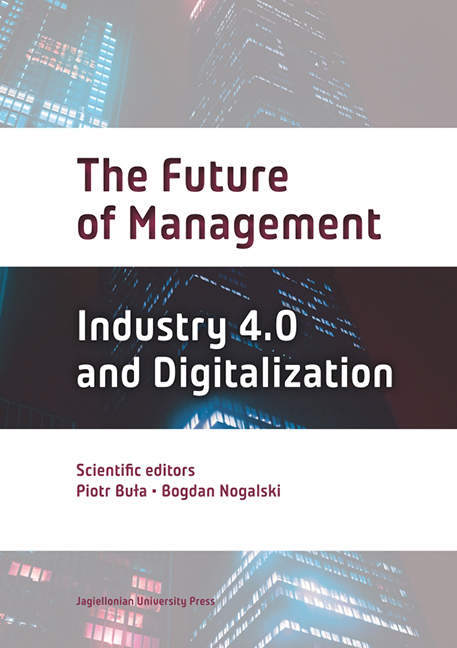Book contents
- Frontmatter
- Contents
- Preface
- Industry 4.0: Social Impacts and Operations Management Challenges
- Business Model Changes in the Presence of Challenges Brought by Industry 4.0
- Communication in Traditional and Network Organisation: Transformation
- Consequences of the Fourth Industrial Revolution in Social and Economic Development in the 21st Century
- Ideology, Trust, and Spirituality: A Framework for Management Control Research in the Era of Industry 4.0
- Renewable Energy through Industry 4.0 on the Example of Photovoltaic Development in Selected European Countries
- Employee Loyalty in the ICT Sector as a Challenge for Building Industry 4.0
- The Importance of Flexibility of Human, Tangible and Intangible Resources in Selected Production Entrepreneurships: Results of Empirical Research
- Challenges Posed for Universities by the Industry 4.0 Environment
- Big Data in Managing Marketing Communication
- Mathematical Risk Assessment Method in the Implementation of Logistic Processes
- Management and Digitisation
- Branding of Time as a New Direction in Tomorrow’s Management
- The Future of Branding
The Importance of Flexibility of Human, Tangible and Intangible Resources in Selected Production Entrepreneurships: Results of Empirical Research
Published online by Cambridge University Press: 16 November 2021
- Frontmatter
- Contents
- Preface
- Industry 4.0: Social Impacts and Operations Management Challenges
- Business Model Changes in the Presence of Challenges Brought by Industry 4.0
- Communication in Traditional and Network Organisation: Transformation
- Consequences of the Fourth Industrial Revolution in Social and Economic Development in the 21st Century
- Ideology, Trust, and Spirituality: A Framework for Management Control Research in the Era of Industry 4.0
- Renewable Energy through Industry 4.0 on the Example of Photovoltaic Development in Selected European Countries
- Employee Loyalty in the ICT Sector as a Challenge for Building Industry 4.0
- The Importance of Flexibility of Human, Tangible and Intangible Resources in Selected Production Entrepreneurships: Results of Empirical Research
- Challenges Posed for Universities by the Industry 4.0 Environment
- Big Data in Managing Marketing Communication
- Mathematical Risk Assessment Method in the Implementation of Logistic Processes
- Management and Digitisation
- Branding of Time as a New Direction in Tomorrow’s Management
- The Future of Branding
Summary
Abstract
The article presents the theoretical basis of resource flexibility. Focuses on human, tangible and intangible resources. An analysis of the literature was carried out and the results of empirical research conducted in selected Polish small and medium enterprises were presented. The study was conducted using a questionnaire and analysis of collected data. In addition to data analysis, recommendations were presented for the surveyed enterprises aimed at making the examined resources more flexible. All companies currently operate in a turbulent environment, the most important factors include the emergence of a society of risk and society of fear, social inequalities, the chaotic nature of the global market, inability to create long-term analyses due to the acceleration of changes or the emergence of global terrorism and global pandemics. Research has shown that the flexibility of individual resources depends on the sector in which a given company operates, therefore tools increasing the flexibility of individual resources must be properly selected for an enterprise.
Keywords: resources flexibility, tangible resources, intangible resources, strategy effectiveness, human resources, flexible organizations
Introduction
The flexibility of management is a subject which has for some time been broadly analysed in the management literature, and also put into practice by managers regardless of the size of their organisation. The capacity to rapidly adapt to sudden changes occurring in the market environment may, today, determine a company's success or failure.
The issue of flexibility is linked to many concepts: flexible forms of employment, flexibility of management and flexible forms of operation of organisations. These and other forms of flexible activity improve the competitive capacity of companies. The term flexibility may be popularly regarded as the ability to adapt to changing environmental conditions. Companies which have acquired such an ability are far better adapted to operating in an unforeseeable, rapidly changing environment.
Literature on the subject contains information which confirm the observation that the capacity for quick, flexible changes depends on two main factors, i.e. the size and the profile of an organisation. The flexibility of operation of large-sized companies is much lower than that of small-sized ones. The reason for this is large “inertia” of such companies.
- Type
- Chapter
- Information
- The Future of ManagementVolume Two: Industry 4.0 and Digitalization, pp. 127 - 140Publisher: Jagiellonian University PressPrint publication year: 2022

